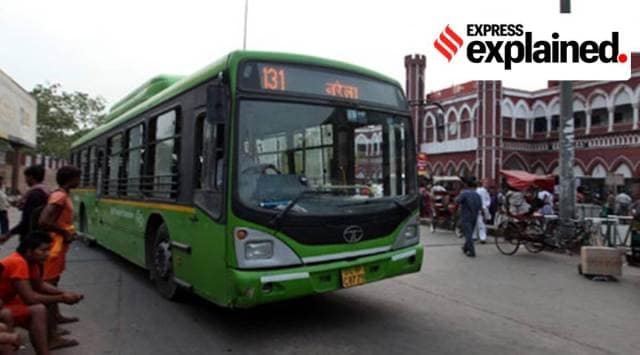Explained: How Delhi’s free bus pass scheme will work; what it might cost the state Govt
Delhi is estimated to have more than 1.1 lakh construction workers, around a million of whom are registered with the Delhi Building and Other Construction Workers' Welfare Board, an autonomous body under the Delhi government.
 Workers who are registered with Delhi Building and Other Construction Workers' Welfare Board will have to apply on the DTC's website or go to one of 34 registration booths set up by the board across the city. (File Photo)
Workers who are registered with Delhi Building and Other Construction Workers' Welfare Board will have to apply on the DTC's website or go to one of 34 registration booths set up by the board across the city. (File Photo)After women, construction workers can now travel for free in Delhi Transport Corporation (DTC) and cluster buses in the national capital. Delhi Deputy Chief Minister Manish Sisodia announced the ‘Free Bus Pass’ scheme as a “Labour Day present” to workers on Wednesday (May 4).
Delhi is estimated to have more than 1.1 lakh construction workers, around a million of whom are registered with the Delhi Building and Other Construction Workers’ Welfare Board, an autonomous body under the Delhi government. Given the capital’s long distances and the associated costs and time of travel, many workers are constrained to look for work close to their homes, or to live, at times with their families, in temporary makeshift accommodation on construction sites.
What is the Delhi government’s Free Bus Pass scheme and how will it work?
Construction workers, including welders, mistris, labourers, porters, painters, fitters, blacksmiths, guards, concrete mixers, crane and pump operators, those engaged in polishing and tiling work, etc., will be provided with a pass that will be valid for three months and will be renewable thereafter for another three months. Sisodia handed over passes to 100 workers on Wednesday.
Workers who are registered with Delhi Building and Other Construction Workers’ Welfare Board will have to apply on the DTC’s website or go to one of 34 registration booths set up by the board across the city. They can apply for either an e-pass or a paper pass, which will be delivered to the recipient within 3-4 days or a week depending on the type of pass.
Newsletter | Click to get the day’s best explainers in your inbox
According to construction board officials, only 5-10 per cent of registered workers currently use buses to go to work, and no more than 2-5 per cent travel by the Metro.
“Construction workers earn between Rs 300 and Rs 600 per day. A large number of them either cycle to work or look for work close to where they live. Many workers are migrants from states like Bihar, Uttar Pradesh and Jharkhand. They mostly live in tents near construction sites to avoid having to spend their meagre earnings on commuting,” an official from the board said.
“With the free pass scheme, we hope more workers will use buses, which will widen their job opportunities across the city,” the official said.
How will the scheme be funded? Will it not be a drain on the DTC’s resources?
A senior DTC official said the cost of an existing quarterly e-pass is Rs 2,280 for non-AC buses and Rs 2,850 for AC buses. A delivery charge of Rs 33 is levied in case a customer wants a paper pass delivered to her home.
“The government says there are 10 lakh registered construction workers in Delhi. So, theoretically, if all these workers apply for the scheme, the government’s subsidy bill for three months will be Rs 228-285 crore,” the official said. “For the whole year, it will be four times that sum.”
The scheme will be funded entirely by the Delhi government, and as such there will be no financial implications for DTC.
“DTC will not face any losses. This is not the first travel subsidy scheme. Several subsidies and discounts are already provided to groups such as women, students, senior citizens, and others. DTC gets the revenue from the government,” another official said.
Which other groups avail of these subsidies? What kind of money are we talking about here?
In 2019, the Delhi government announced free passes for all women. In March 2022, DTC’s woman ridership was recorded at 1.7 crore, and the corporation received Rs 17 crore against the sale of pink tickets that month. There could be a degree of overlap between the beneficiaries of the free women’s and worker’s passes.
The sale of pink tickets was hit by the Covid-19 pandemic, lockdowns, and restrictions on the numbers of passengers in buses. The ridership, both overall and that of women, has improved since March, officials said. Currently, around 24 lakh people travel in DTC buses on weekdays, and 22.5-23 lakh on Saturdays and Sundays.
Students, journalists, senior citizens (older than 60), blind persons, and war widows are among the groups that get discounts between 80 and 85 per cent on monthly bus passes. For example, a monthly student all-route bus pass costs Rs 150, while, a general AC bus pass for a month costs Rs 1,000 and a non-AC pass costs Rs 850.






































